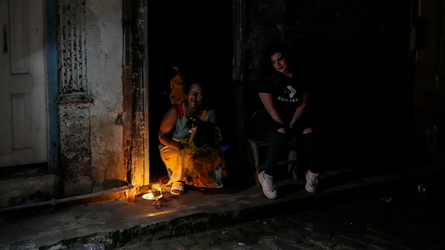
Residents pass the time during a blackout following the failure of a major power plant in Havana, Cuba on Saturday, Oct. 19, 2024.
Ramon Espinosa/AP
Millions of Cubans remained without power for a third day in a row Sunday after fresh attempts to restore electricity failed overnight and the power grid collapsed for the fourth time.
The Cuban Electrical Union said about 16% of the country had had power restored when the aging energy grid again overloaded late Saturday, and according to the local state-run power company more than 216,000 people in the capital of Havana, a city of two million, had power restored Sunday afternoon.
However, later Sunday afternoon, the power grid collapsed again, for the fourth time since Friday.
At a news conference on Sunday, Energy and Mines Minister Vicente de la O Levy said 52,000 power workers were trying to restore service but the arrival of Hurricane Oscar in eastern Cuba would likely hamper their efforts.
Hurricane Oscar made its first landfall on Inagua Island in The Bahamas, with maximum estimated sustained winds of 80 mph, according to the 5 a.m. EDT update from the National Hurricane Center on Sunday.
It is forecast to reach the northeastern coast of Cuba as a hurricane later this afternoon. “Weakening is expected after landfall, but Oscar could still be a tropical storm when it moves north of Cuba late Monday and moves across the central Bahamas on Tuesday,” NHC said.
Cuba’s first island-wide blackout happened on Friday, when one of the country’s major power plants failed, according to the energy ministry. Most people in the 10 million-strong country have had their access to power interrupted since then.
Hours after officials said power was being slowly restored, the country suffered a second nationwide blackout on Saturday morning.
The blackouts threaten to plunge the communist-run nation into a deeper crisis. Water supply and keeping food fresh are both dependent on reliable power.
Havana residents queue for bread
Some people began flooding WhatsApp chats with updates on which areas had power, while others arranged to store medications in the fridges of those who briefly had power – or were lucky enough to have a generator.In Havana, residents waited for hours to buy a few loaves from the handful of locations selling bread in the capital. When the bread sold out, several people argued angrily that they had been skipped in line.
Many wondered aloud where Cuba’s traditional allies were, such as Venezuela, Russia and Mexico. Until now, they had been supplying the island with badly needed barrels of oil to keep the lights on.
Meanwhile, tourists were still seen circling Havana’s main avenues in classic 1950s cars, although many hotel generators had run out of fuel.
One foreign visitor told CNN that Havana’s José Martí International Airport was operating in the dark on emergency power only, adding that printers did not work to issue tickets and there was no air conditioning in the terminal.
Reuters reporters witnessed two small protests overnight into Sunday, while videos of protests elsewhere in the capital have also surfaced.
The Cuban government is cancelling classes for students from Monday until Wednesday, having previously cancelled them on Friday. It has also instructed non-essential workers to stay home. The US embassy in Havana will be open only for emergency services on Monday.
Cuban officials have blamed the energy crisis on a confluence of events, from increased US economic sanctions to disruptions caused by recent hurricanes and the impoverished state of the island’s infrastructure.
In a televised address on Thursday that was delayed by technical difficulties, Cuban Prime Minister Manuel Marrero Cruz said much of the country’s limited production was stopped to avoid leaving people completely without power.
“We have been paralyzing economic activity to generate (power) to the population,” he said.
The country’s health minister, José Angel Portal Miranda, said Friday on X that the country’s health facilities were running on generators and that health workers continued to provide vital services.
Article Link
Archive